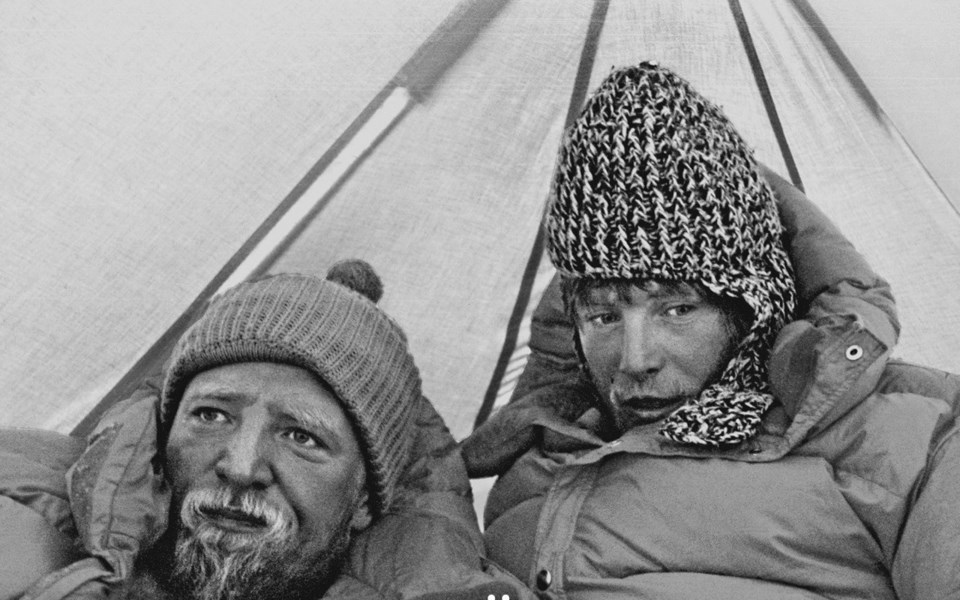"Isn't a person who can live on nothing much stronger?"
— Voytek Kurtyka
When Bernadette McDonald's Art of Freedom: The Life and Climbs of Voytek Kurtyka won the 2017 Banff Mountain Book Award for Non-Fiction Mountain Literature, and was shortlisted for the 2017 Boardman Tasker Prize for Mountain Literature, it was hardly a surprise.
First, McDonald has been similarly honoured for previous books, emerging as one of our sharpest chroniclers of climbing history and culture. Not only is her literary non-fiction rendered with great élan, but also consummate understanding, as if she intimately knows each climber she shines a light on — testament to her meticulous research, personality cross-referencing, and laser insight. Which brings us to a second point: no one was better equipped to write a biography of perhaps the world's most reclusive but remarkable climber, a fact that even the fiercely furtive, famously cerebral, notoriously interview-shy Kurtyka accepted in entrusting McDonald to lay bare his life.
In capturing Kurtyka's history, significant successes, occasional failures, complicated relationships and unbridled joys, McDonald has crafted a masterpiece biography of a little-understood but visionary climber who, as one reviewer noted, "tackled his ascents with an ascetic, intellectual minimalism that resulted in pure, unadulterated alpinism."
And yet, brilliant and engaging as this book is, it's but one of several windows into a rarified world that McDonald has managed to make herself expert in: the cadre of Polish climbers — to which Kurtyka belonged — who changed the world of alpine climbing in a decade-and-a-half stretching from the late 1970s into the early 1990s.
A previous McDonald book, 2011's Freedom Climbers — notably the most honoured piece of mountaineering literature ever published in Canada — chronicles these extraordinary adventurers who emerged from behind the Iron Curtain to become the world's leading Himalayan climbers. Though they occupied "a dreary, war-ravaged landscape, with seemingly no hope of creating a meaningful life, these curious, motivated and skilled mountaineers created their own free-market economy under the very noses of their Communist bosses and climbed their way to liberation."
It took a few years for the world to realize what was happening. The Americans, British, Italians and French dominated climbing magazines in the 1980s with their braggadocio and sentimental prose, creating the illusion that Western climbers comprised the leading edge of alpinism. But when the hellish Himalayan winter descended and the Western loudmouths retreated, the Poles struck. Over the course of eight seasons they rocked the alpine world with spectacular ascents: Krzysztof Wielicki and Leszek Cichy conquered Mount Everest in February 1980; Manaslu fell in January 1984 to Maciej Berbeka and Ryszard Gajewski; 1985 saw two major achievements —Dhaulagiri in January, by Andrej Czok and the legendary Jerzy "Jurek" Kukuczka, and Cho Oyo in February by Baebeka and Maciej Pawlikowski; Kangchenjunga was summited in January 1986 by Kukuczka and Wielicki; Kukuczka and Artur Haizer climbed Annapurna in February 1987; and Wielicki drove his ice axe into the top of Lhotse on New Year's Eve 1988. For 17 years, these remained the only 8,000-metre peaks climbed during the Himalayan winter, each achieved by tough-as-nails Poles with mostly homemade gear — hand-sewed clothing and harnesses, hardware salvaged from automobile parts — and minimal food.
In an early 1990s article, Kurtyka explained what he labelled "The Polish Syndrome."
"Despite poverty and limited freedom, (we) were overtaken by a tremendous inspiration to overcome all barriers. The Himalaya offered an exciting escape from the drab system and grey stability of (home), and a rare opportunity for creative communication with the outside world."
If you ask non-climbers whom they consider the greatest Himalayan climber, the answer is usually Reinhold Messner. But ask a climber the same question, and they might say Kurtyka (for his 1985 "climb of the century" on Gasherbrum IV) or, more often, Jerzy "Jurek" Kukuczka — a frequent Kurtyka partner acknowledged as the toughest of the tough. "Jurek was the greatest psychological rhinoceros I ever met, unequalled in his ability to suffer and his lack of fear," noted Kurtyka. "Characters like that, when they meet an obstacle, strike against it until they either crush it or break their necks. Recognizing these twin beasts inhabiting Kukuczka goes a long way towards explaining his splendid success — and ultimately death."
Aside from Kukuczka's death, differences between he and Messner include the latter being relatively well off to start, and making good money on books, films and lectures, while Kukuczka was a poor, anonymous figure who struggled and suffered in silence, ascending only the most difficult new routes, often in alpine style during winter. Both conquered all 14 of the range's 8,000-metre peaks. Messner was first, but Kukuczka faster, accomplishing the feat in only eight years, between 1978 and 1987. Furthermore, Kukuczka summited 11 on new routes, four as winter first-ascents, one — Makalu — solo, and all save Everest without oxygen.
Save for the occasional parade awaiting them at home, the path of the Poles through the Himalaya was a quiet, understated, selfless ode to freedom. The ever-philosophical Kurtyka sums it up best: The most significant dimension of freedom is the freedom from one's own ego — in other words, from the feeling that I am the centre of everything.
Leslie Anthony is a Whistler-based author, biologist and bon vivant who has never met a mountain he didn't like.




